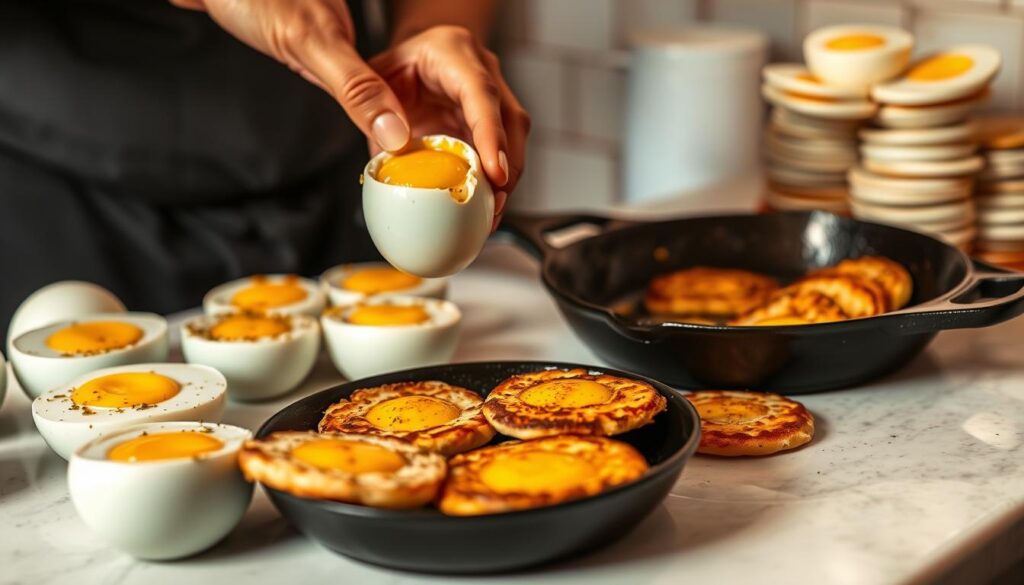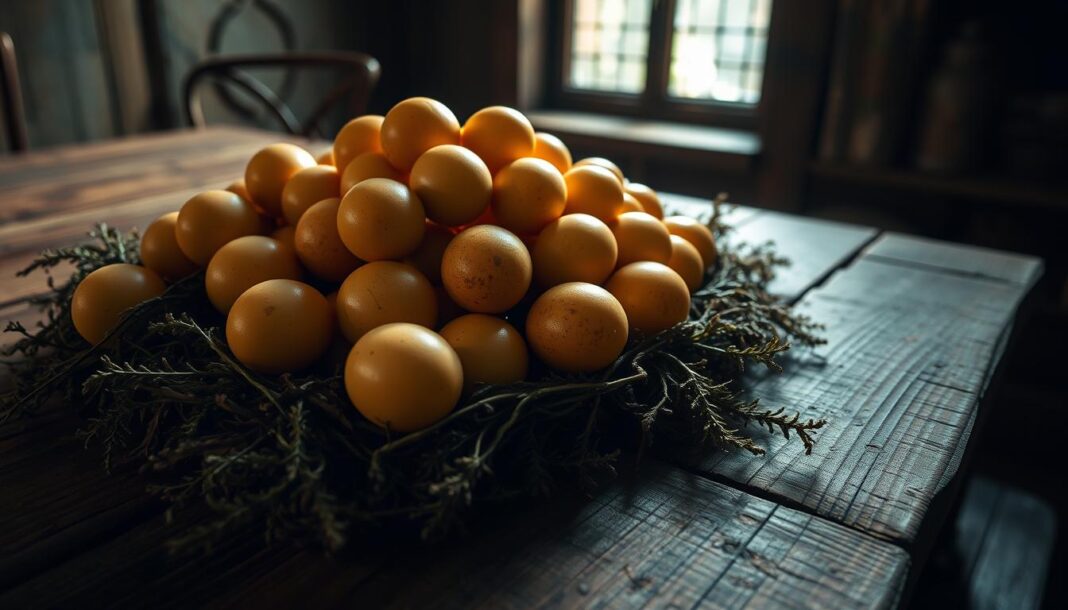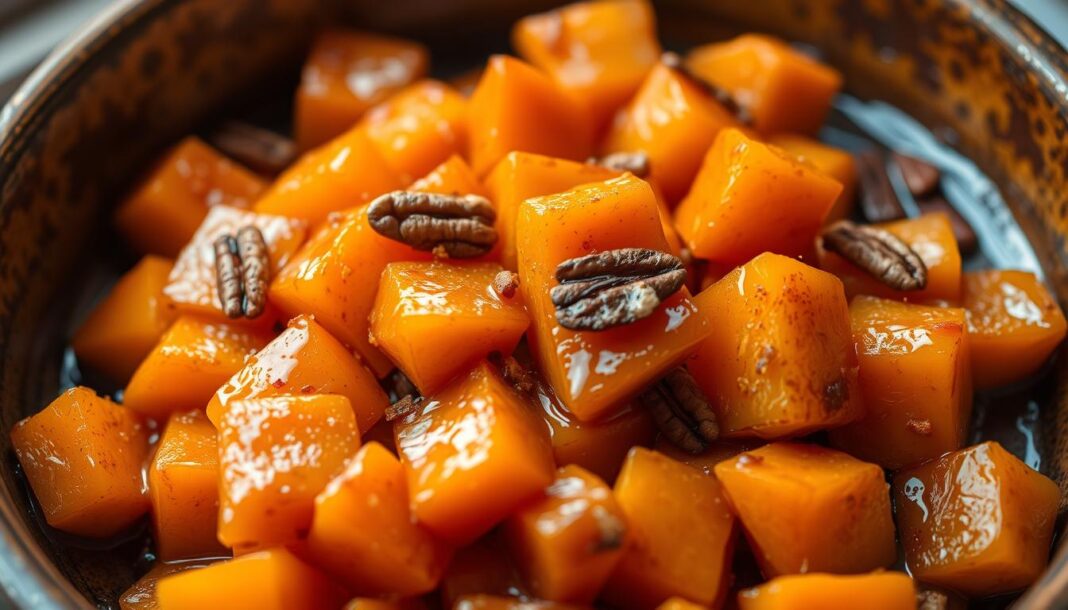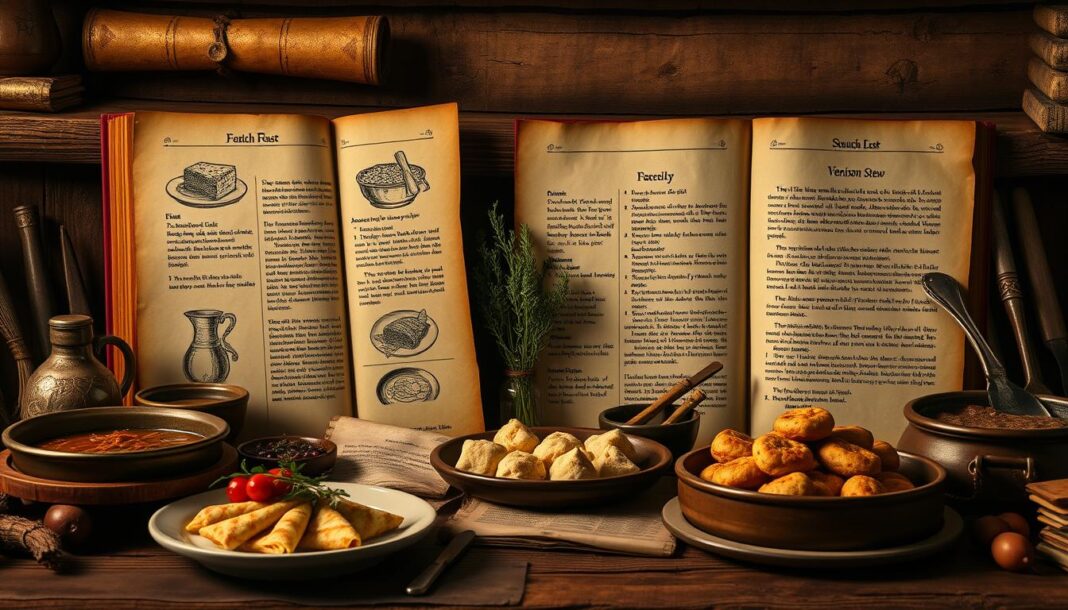We explore the fascinating world of kwama, a cornerstone of Dunmer cuisine, known for their nutritious eggs. These large insectoids, native to Vvardenfell, are primarily kept for their eggs, which are a rich food source.
In our comprehensive guide, we delve into the biology of kwama and the various culinary applications of their highly prized egg. We examine how these eggs have been harvested and prepared throughout history, offering insights into traditional cooking methods.
By understanding the cultural significance and culinary versatility of kwama eggs, you’ll gain a deeper appreciation for their place in both historical and contemporary cooking, empowering you to refine your cooking techniques.
The Origins and Biology of Kwama
Understanding Kwama requires a look into their origins, species hierarchy, and the remarkable way they produce eggs. Kwama are fascinating creatures native to the regions of Morrowind, known for their agricultural significance.
Species and Hierarchy
Kwama colonies are structured around a strict hierarchy, with different castes performing unique roles. The Queen is central to egg production, laying hundreds of kwama eggs that are then cared for by Worker Kwama.
Colonies and Egg Production
Eggmines are established within Kwama colonies, where miners carefully harvest eggs while ensuring the colony’s sustainability. The eggs come in two sizes, large and small, with varying alchemical properties.
| Egg Size | Alchemical Properties | Culinary Use |
|---|---|---|
| Large | High | Specialty dishes |
| Small | Moderate | General cooking |
Kwama in Dunmer Cuisine and Culture
The Dunmer people’s relationship with kwama is deeply rooted in their cuisine and cultural practices. Kwama products, particularly kwama eggs, play a vital role in traditional Dunmer cooking and are often at the center of cultural and familial gatherings.
Cultural Significance of Kwama Eggs
Kwama eggs hold significant cultural value, symbolizing fertility and abundance. They are often served during special occasions and are considered a delicacy. The cultural significance of these eggs is evident in the various traditional dishes prepared for festivals and family gatherings.
Traditional Kwama-Based Foods
Traditional Dunmer cuisine features a variety of dishes made from kwama products. Kwama eggs can be boiled, roasted, or eaten raw and remain fresh for weeks. Other products like Scrib Jelly and Scrib Jerky showcase the Dunmer’s resourcefulness in food preparation. Regional variations in egg recipes reflect local ingredients and cultural influences, highlighting the diversity within Dunmer cuisine.
Essential Kwama Egg Cooking Techniques
Kwama eggs are a delicacy that can be prepared in numerous ways, each bringing out unique flavors and textures. The key to cooking Kwama eggs lies in understanding the various techniques that can enhance their natural flavor and preserve their nutritional value. We will explore the different methods of preparing Kwama eggs, from basic storage and handling to advanced cooking techniques.
Preparing and Storing Kwama Eggs
Proper preparation and storage are crucial for maintaining the freshness and quality of Kwama eggs. Since Kwama eggs can remain fresh for weeks, it’s essential to store them correctly to preserve their flavor and texture. We recommend keeping them in a cool, dry place, away from direct sunlight.
Boiling and Roasting Methods
Boiling and roasting are two popular methods for cooking Kwama eggs. Boiling helps retain the delicate flavor, while roasting enhances the egg’s natural sweetness. To boil, gently place the eggs in boiling water for a few minutes. For roasting, preheat the oven to a moderate temperature and roast until the eggs are cooked through.

Raw Egg Preparations
Raw Kwama eggs can be a delicacy when handled and prepared correctly. We discuss the safety considerations for consuming raw Kwama eggs, including proper sourcing and handling techniques. Traditional preparations include delicate custards and silky sauces that showcase the pure flavor of fresh Kwama eggs. Marination techniques can also transform raw Kwama eggs, creating complex flavor profiles.
The textural qualities of raw Kwama eggs make them ideal for specific culinary applications where their binding and emulsifying properties shine. Modern culinary innovations have expanded the repertoire of raw egg preparations, incorporating techniques from various global cuisines.
Modern Applications of Kwama in Contemporary Cooking
In contemporary cooking, Kwama eggs are being reinvented with modern techniques and cross-cultural influences. Chefs across Tamriel are experimenting with novel textures and presentations, elevating the traditional importance of Kwama eggs. The growing interest in regional cuisines has made eggs a sought-after ingredient in high-end establishments. Sustainable harvesting practices ensure the long-term viability of Kwama colonies, meeting the increasing demand. As a result, Kwama eggs are being incorporated into wellness-focused diets and paired with premium ingredients, creating sophisticated flavor combinations that showcase their unique properties.


